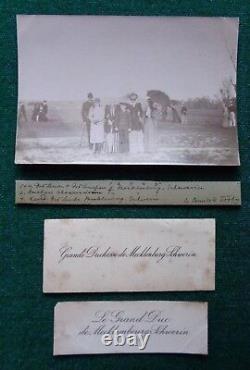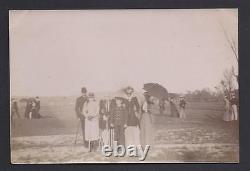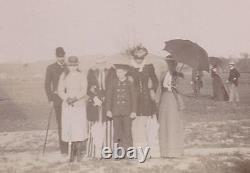Grand Duke Mecklenburg-Schwerin Grand Duchess Anastasia Russia Antique Photo












Bibelotslondon Ltd is a UK registered company based in London Bridge dealing in ephemera and curiosities from Britain and around the world. Our diverse inventory is carefully chosen and constantly evolving.
We work very hard to offer the highest quality works at competitive prices. Our inventory is listed online, and we strive to keep our website completely up to date, so our customers can easily check availability. We believe in offering clients items that are unique and rare for aficionados of the antique and collector's world.Bibelot is a late nineteenth century word derived from the French word bel'beautiful', meaning a small item of beauty, curiosity or interest. The word ephemera is derived from the sixteenth century Greek word ephmera meaning a printed or hand written paper not meant to be retained for a long period of time. The photograph is also accompanied by the embossed calling cards of the Grand Duke and Grand Duchess.
Franz was the penultimate Grand Duke of Mecklenburg-Schwerin, born in Schloss Ludwigslust the son of Friedrich Franz II, Grand Duke of Mecklenburg-Schwerin, and his first wife Princess Augusta of Reuss-Köstritz. From an early age Friedrich Franz suffered from asthma and severe breathing difficulties.He could not live in the north of Europe and lived instead on the shores of the Mediterranean, where the mild climate agreed with him. His homosexuality was an open secret. Friedrich Franz's death in Cannes on 10 April 1897 is shrouded in mystery, as he was originally reported to have committed suicide by throwing himself off a parapet of a bridge. According to the official account of his death, however, he was in his garden when he experienced breathing difficulties and staggered around before falling over a low wall.
He was succeeded by his son Friedrich Franz IV, who would be the last Grand Duke of Mecklenburg-Schwerin. Friedrich Franz married Grand Duchess Anastasia Mikhailovna of Russia in St Petersburg on 24 January 1879. The Grand Duchess never became used to her new country where she was unpopular and so they lived amongst other places at Villa Wenden in Cannes. Of neo classic style with a German touch, the building was constructed in 1889, and rises from a garden terrace sustained by a spectacular peripheral wall.
Torby was the eldest daughter of Prince Nicholas William of Nassau and Natalya Aleksandrovna Pushkina. Sophie was born in Geneva, Switzerland, first born of Prince Nicholas of William Nassau and Natalya Aleksandrovna Pushkina. Since the marriage of the parents was considered morganatic, it was considered inappropriate for her father's title and rank. His paternal grandparents were William, Duke of Nassau, and Pauline Princess of Württemberg, while maternal ones were the famous Russian poet Alexander Sergeevich Pushkin and Nataly Nikolaevna Goncharova.
For contracting this marriage without permission, Emperor Alexander III of Russia, stripped him of his military titles and banished the couple from Russia. For some years he lived in Wiesbaden, Nassau and in Cannes. He settled permanently in England in 1900, leasing Keele Hall in Staffordshire and later Kenwood House on the outskirts of London.
He became a prominent member of British society, one of his daughters marrying into the British aristocracy and another marrying a great-grandson of Queen Victoria. He lost his fortune with the fall of the Russian monarchy in 1918. Three of his brothers were killed by the Bolsheviks, but he escaped the Russian Revolution because he was living abroad.
He spent his last years living under reduced circumstances with the financial help of his son-in-law Sir Harold Wernher. Anastasia was a daughter of Grand Duke Michael Nicolaievich of Russia and a granddaughter of Tsar Nicholas I of Russia. She was raised in the Caucasus, where she lived between 1862 and 1878 with her family. In 1879 she married Friedrich Franz III of Mecklenburg-Schwerin, who in 1883 became the reigning Grand Duke of Mecklenburg-Schwerin.
The couple had three children, but her husband was plagued by ill health and they spent most of the year living abroad. The Grand Duchess never became used to her new country where she was unpopular. After the death of her husband in 1897, her visits to Schwerin were sparse. A strong-willed, independent and unconventional woman, she caused a royal scandal when in 1902 she had a child fathered by her personal secretary.In her widowhood, she lived most of the year in the South of France. During World War I, she decided to settle in neutral Switzerland, living in Lausanne.
She died after a stroke a few years later. Grand Duchess Anastasia Mikhailovna was born at the Peterhof Palace on 28 July O. 12 July 1860, the second of the seven children of Grand Duke Michael Nicolaievich of Russia and his wife, Grand Duchess Olga Feodorovna (born Princess Cecilie of Baden). She was only two years-old when her father was appointed Viceroy of the Caucasus in December 1862 and the family moved to Georgia.
Anastasia Mikhailovna grew up in her father's palace in Tiflis amidst the wild and austere atmosphere of the Caucasus. The family lived in a huge palace and also owned a rural estate near Borjomi, a summer residence, the Mikhailovskoe, near St Petersburg, and a residence on the Black Sea. Known in the family as "Stassie", Anastasia Mikhailovna was the only daughter among seven children.She was the object of devotion not only as her father's favorite, but was spoiled by her six brothers. Her father was occupied with his militaristic and governmental activities, while her mother, a strict disciplinarian, showed little affection and raised the children with an iron hand.
Anastasia's brothers found in her an outlet for love and tenderness that was so lacking in their parents. She was particularly close to her eldest brother, Nicholas Michailovich, with whom she shared artistic interest. She grew up to be very independent, intelligent and strong-willed, with a warm and happy personality. Tall and slim, she had dark hair and green oriental eyes. Her education centered in languages; she learned French, German, and English besides her native Russian.In 1878, when Anastasia was not yet eighteen, her mother and Grand Duchess Maria Pavlovna, wife of Grand Duke Vladimir Alexandrovich, arranged her marriage with Maria's eldest brother, Friedrich Franz, Hereditary Grand Duke of Mecklenburg-Schwerin. He was 27 years old and heir to the Grand Duchy of Mecklenburg-Schwerin in northern Germany. Their grandmothers, Princesses Alexandrine and Charlotte of Prussia, were sisters, and Friedrich Franz was also a direct descendant of Tsar Paul I of Russia.
In the spring of 1878, while Anastasia was visiting St Petersburg with her mother, Prince Friedrich Franz, who was staying with his sister at the Vladimir Palace, asked her hand. He was rich, the heir of a German Grand Duchy and good-hearted, but had delicate health, suffered from asthma, a rash, and a weak heart.
The engagement was resented by Anastasia's brothers, who did not want to be separated from her. Anastasia herself was not happy with her fiancé, appalled by his skin condition. He used to get periodic attacks of eczema on the face and body, which confined him into complete seclusion for long periods.
As was often the case with dynastic marriages, she was given no choice by her parents, who wanted to secure a good position for her. The betrothal was announced on 4 May.
In the following days Grand Duchess Maria Pavlovna described Anastasia in a letter to her future father in law: She is enchantingly dear in both her character and her appearance. I do not doubt for a moment that she will fill her place and her new position to perfection now, and will be equal to the future. In her movements, her carriage and her speech she will remind you of Queen Olly though she has big, clear expressive eyes, that promise much.
To the outward appearance, her figure is still very slim and childlike, but when she speak this impression is wholly dispelled. She is very well educated and carefully raised. In October, Anastasia and her family traveled to St Petersburg to prepare for the wedding. The marriage took place on 24 January 1879 in the Winter Palace, and she was given away by her uncle, Tsar Alexander II; there was first an Orthodox ceremony, and then a Protestant service.
The wedding was a grand affair, and representatives of all the ruling houses of Europe attended. On 8 February 1879, Anastasia and Friedrich arrived in Schwerin. Her father-in-law Friedrich Franz II, Grand Duke of Mecklenburg-Schwerin was the reigning monarch of the Grand Duchy of Mecklenburg-Schwerin and presided over a large family. The young couple settled in the Marienpalais, but Anastasia was not allowed to arrange her apartments according to her own taste. She was homesick and found a strict and old-fashioned court and an oppressive atmosphere.Although her own mother was German, Anastasia Mikhailovna never overcame her dislike for her adopted country. The couple made brief visits to Baden-Baden and Berlin. Anastasia was soon pregnant and her eldest child, Alexandrine, was born in December on the first year of her marriage.
Shortly after, her husband's ill health forced them to travel to a warmer climate. In March 1880, Anastasia made her first visit to Russia since her marriage. Petersburg for the funeral of her uncle Alexander II. While there, her husband suffered one of his asthma attacks. His frail health allowed Anastasia the perfect excuse to spend as little time as possible in Schwerin.
She traveled frequently visiting her family in Russia and spending long sojourns abroad, looking for a warm climate for her husband's ailments, in southern Italy and France. They were living in Palermo, when in April 1882 a second child, Friederich Franz, was born. In the spring of 1883, Anastasia and her husband were in Palermo at the death of her father-in-law on 15 April 1883.Friedrich Franz was too ill to attend his father funeral. Her husband ascended to the throne as Grand Duke Friedrich Franz III of Mecklenburg-Schwerin. At first, Anastasia enjoyed her new position as the wife of the reigning Grand Duke and took residence in sumptuous apartments in Schwerin Castle.
However, soon after she wanted to return to Italy or France. The population of Mecklenburg-Schwerin did not want their sovereign living somewhere else, and Anastasia was heavily criticized. A compromise was reached, and the Grand Duke and his wife would live in Schwerin for five months and could stay wherever they wanted for the rest of the year, on the condition that their children were to be born in Schwerin. Their youngest daughter, Cecile, was born in Schwerin in 1886. While in their Grand Duchy, Anastasia Mikhailovna spent as little time as possible in Schwerin Castle in the summer, preferring her residence in Gelbensande, a hunting lodge built in 1886 in the style of an English cottage near Rostock and the Baltic Sea.
There, the couple lead the simple life they preferred. Friederich Franz spent most his time hunting while Anastasia and the children rode or drove out, visited local people or enjoyed the beach and the surrounding forest.
The grand duchess regularly celebrated her birthdays at Gelbensande and her father and brothers often came for the hunting. In the Winters the family moved to Cannes where they celebrated Christmas.
Between 1887 and 1889, her husband had constructed for her the Villa Wenden, a large Italian-style palace situated on the side of a mountain that dominated the bay of Cannes. They lived there every year from November until May, stopping in Paris on their way back to Germany. Grand Duchess Anastasia brought up her children with simplicity and more freedom than she received from her parents, and would keep a close relationship with them. She spoke French to her husband and English with her children. She was a keen tennis player, with her own tennis court at the Villa Wenden.She loved Italian music, particularly the operas of Puccini, and the theater. Her extant letters reveal a warm, caring person, who always seems to have been happy about life. She frequented many other European royals who stayed at the Riviera; her parents and brothers were also frequent visitors.
Her mother died of a heart attack in 1891, and Anastasia remained very close to her widower father and her brothers, particularly the two eldest Nicholas and Michael. Anastasia spent lavishly from the Grand Duke's income and her own dowry, for which she was widely criticized, but she loved to shock people who condemned her. In the winter of 1896 - 1897, the health of Grand Duke Friedrich Franz deteriorated.
In the spring, Anastasia took her husband to Grasse in the hope that the change of location might initiate a recovery. It was during this time that their eldest daughter, Alexandrine, was engaged to the son of the Danish Crown Prince, who later became King Christian X of Denmark.
Anticipating the worst, she sent for their son, who was studying in Dresden. On April 10, while the family and household were at dinner, a coachman found Grand Duke Friedrich Franz unconscious at the bottom of the villa's 25-foot (7.6 m)-high retaining wall on the road below the rose-festooned parapet, which encircled the villa's garden.
He had jumped in an attempt to end his life. He was carried back to the villa, where he finally died. The official report was that the sick grand duke, gasping for air, had gone to the balcony falling down over the railing accidentally. The Grand Duchess and her two elder children took the body back to Mecklenburg for the funeral. She was resented by her family in law and was so unpopular in Schwerin that she was suspected of killing him. Anastasia seemed to have mourned her husband sincerely, telling her lady in waiting, I have lost my best friend. At her husband's death Anastasia inherited all his private property; the Villa Wenden and Gelbensande, even though this palace should have been passed to her 15-year-old son, who became Friedrich Franz IV under the regency of his uncle Duke Johann Albrecht until 1901 when he came of age.Once the mourning period passed, in July 1897, Anastasia took her eldest daughter, Alexandrine, to Denmark to meet the Danish Crown Prince's family in private. On her insistence, the wedding, on 26 April 1898, took place neither in Schwerin nor in Denmark, but in the Villa Wenden in Cannes.
Grand Duchess Anastasia was only thirty-six years-old when she became a widow. From then on, she rarely visited Schwerin, always staying at Gelbensande. She preferred to live in the Riviera or to travel to Saint Petersburg, Paris, or England. While remaining very attached to her family, her thirst for living, strong personality, and spirit of independence caused a lot to talk about. The grand duchess kept a small apartment in Paris, where she led the life of the rich and beautiful, going to parties looking wildly for distractions.
She also gambled heavily at Monte Carlo. Fascinated by her, the croupiers would roll the ball intentionally into her favorite section of the roulette wheel, to increase her chances of winning. To her many hobbies, she added motoring and clay pigeon shooting. Anastasia started an affair with her personal secretary, Vladimir Alexandrovitch Paltov, and became pregnant by her lover.
At first she pretended that her swelling was the result of a tumor. When the time came to deliver, she claimed she had contracted chicken pox for which she had to be quarantined. Her illegitimate son, Alexis Louis de Wenden, was born in Nice on 23 December 1902. The name de Wenden was granted by King Christian IX of Denmark after Anastasia's villa. She did bring up her illegitimate son herself.
When later he was sent to study in a boarding school in Normandy, she wrote to him every day. Grand Duchess Anastasia, although close to her son, Friedrich Franz IV, found him willful and humorless. She encouraged him to marry young. On June 7 1903, he married Princess Alexandra of Hanover. Anastasia was very unpopular in Germany, due to her French sympathies.Kaiser Wilhelm II of Germany particularly disliked her, but Cecile, her youngest daughter, attracted the attention of Wilhelm's eldest son, Wilhelm, German Crown Prince during Friedrich Franz IV's wedding celebrations. They got married on 6 June 1905. Anastasia was allowed to come to the court of Berlin only twice, first for the wedding and later when the first son of this marriage was born. She was advised never to live near her daughter.
Anastasia's father Grand Duke Michael Nicolaievich of Russia had a stroke years earlier, and moved to live near her in the South of France. Upon his death in 1909, she inherited immense wealth. In the first decade of the 20th century, the Grand Duchess occupied herself visiting her relatives, her children, growing number of grandchildren and her hobbies: reading, going to parties and the gambling tables in nearby Monte Carlo. In the summer of 1914, just before World War I broke out, Grand Duchess Anastasia visited her brother, Grand Duke Michael Mikhailovich of Russia, and his family in England.
When many eagerly greeted the outbreak of war, after the Austrian ultimatum, she wrote to Tsar Nicholas II: "I hope that the war will not happen and that we even can say'perhaps in a few days, we'll all be together again'". The conflict split her family.
Her son was a reigning prince in Germany and her younger daughter was the Kaiser's daughter in law. In the opposite side, her brothers in Russia were fighting to defeat the Central Powers.
Anastasia sided with her native country. Technically a German princess, the grand duchess could neither remain in France, a country at war with Germany, nor could she return to Schwerin, now an enemy of her native Russia. Therefore, she decided to settle in neutral Switzerland. She spent the war years living at the Savoy Hotel in Lausanne, giving her villa in Cannes for use as a hospital for wounded officers of the Russian Expeditionary Force in France. During the war, she managed to obtain news of her daughter Cecile and her son, Friedrich Franz, through her daughter, Alexandrine, Queen in neutral Denmark.
The Bolsheviks killed three of her brothers, Grand Dukes Nicholas, George and Serge, during the Russian Revolution. The fall of the German monarchy after the war resulted in the loss of the crown for both her son in Schwerin, and her daughter Cecile in Germany. After the end of the war, Grand Duchess Anastasia decided to go back to France; she could not return as a German Princess, and with her Russian passport, she sneaked inside the country with the entourage of her cousin, Princess Catherine Yourievskaya, who was a refugee in Lausanne and was heading toward Nice. Once in France, Grand Duchess Anastasia created a charitable foundation to help Russian exiles who had emigrated to France, with Valdimir Paltov as its president. She settled at Villa Fantasia at Eze, near Cannes. There she spent her last years, taking up her old social life. In the first week of March 1922, shortly after attending a party given by her nephew, Grand Duke Andrei Vladimirovich in Cap-d'Ail, Grand Duchess Anastasia fell ill. She suffered a stroke and died on 11 March 1922 in Èze.She was 61 years old. The Baroness de Stoeckl, who had known her well commented And so passed on the last great character of the Romanoff dynasty. First, she was always an Imperial highness who knew how to carry her rank but, no least, a woman who loved and who lived. With the death of the grand Duchess, her children were reunited for the first time since 1914. Her natural son, Alexis Louis de Wenden, remained in France.
She was buried beside her husband in Ludwigslust. Among her direct descendants are Queen Margrethe II of Denmark and Prince George Frederick of Prussia, head of the House of Hohenzollern. The male line of the House of Mecklenburg-Schwerin died out with her grandson, Hereditary Grand Duke Friedrich Franz, in 2001. Photo Size: 11 x 7.5 cm approx. Photos form part of the description.

